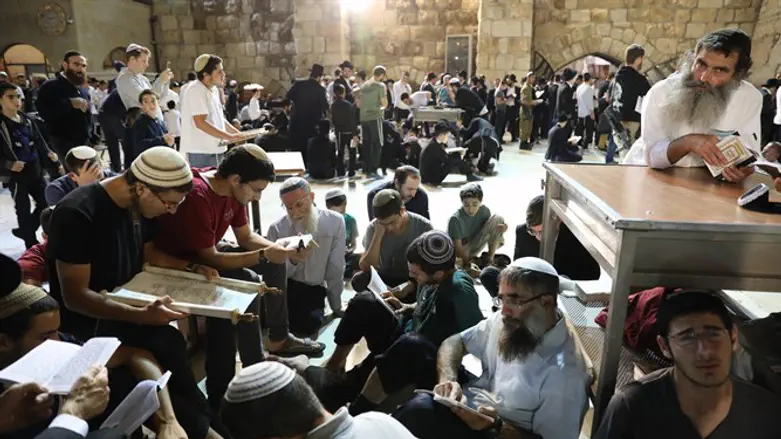
Question: The Sages prohibited learning any Torah that makes one happy on Tisha B'Av, so what can I learn?
Answer from the Rabbis at Yeshiva.co:
This is a list of some of the things you can learn on Tisha B'Av:
Tanach (bible): The scroll of Eicha with the commentators, the Mdrash of Eich Raba, Melachim b: chapters 24-25, Yirmiyahu: chapters 36-43, Iyov: the bad parts (most of the book).
Gemara: Shabbat 55A, Ta'anit 26A (five things had occurred...), Moed Katan: all the chapter of "Ve'elo megalchin" (chapter 3), Gitin the stories of the distruction from page 55A, Baba Batra 60a.
Halakha: Shulchan Aruch Yore De'aa 341-403 - the laws of mourning, Shulchan Aruch Orach Chaim 554-561- tha laws of Tisha B'Av.
Jewish Thought: Netzach Yisrael of the Mahral chapters 4-9 disscusing the stories of the distruction.
Non-Jewish Books: The Jewish War by Flavius Josephus, history books that tell about the time of the Churban (Temples' destruction), books about the Holocaust. "
What to do when Tisha B'Av starts on Motzei Shabbos
Rabbi Eliezer Melamed explains the Halakhot of the transition from Shabbat to Tisha B'Av starting with what we should do on Shabbat itself. "The time between sunset and shortly after the emergence of the stars is both Shabbat and Tish’a B’Av. During that time, it is forbidden to do anything that would appear like a custom of mourning, because we do not mourn on the Sabbath.
On the other hand, after sunset, we avoid doing anything that is not necessary for the sake of Shabbat, like eating, drinking, washing, and anointing. Therefore, we eat the third Sabbath meal (Seudah Shlishit) like we do on any other Shabbat, however, we stop eating and drinking before sunset. We also refrain from washing and anointing ourselves after sunset, however, one who relieves himself during Bein Hashmashot (the period after sunset before Shabbat is oer)should wash his hands normally."
What about changing clothes and shoes? Rabbi Melamed replies "We remain in our Sabbath clothing, keep our shoes on, and continue to sit on chairs and greet each other until a few minutes after Tzet Hakochavim (stars becoming visible). Then, we say "Baruch ha’mavdil bein kodesh le’chol", afterwards, we remove our shoes, take off our Sabbath garments, and change into weekday clothes. The prevalent custom is to remove one’s shoes only after Shabbat has ended. "
And how do we make Havdala on Motzei Shabbat? "The fast begins immediately after Shabbat, making it is impossible to say havdalah over a cup of wine. Therefore, we postpone saying this form of havdalah until after the fast. Nevertheless, we say havdalah – "Ata Chonantanu" – in the Ma’ariv prayers, after which we are permitted to do work. Some say that women should pray Ma’ariv on such a Saturday night, in order to make havdalah in ‘Ata Chonantanu’.
Women who do not follow this practice should say, ‘Baruch ha’mavdil bein kodesh le’chol’, after which they are permitted to do work.
At the end of the fast, two blessings are recited: Borei pri hagefen, and HaMavdil (‘He Who separates’). No blessing is made on spices or fire. When the fast is over, it is forbidden to eat before making havdalah over the cup of wine, because saying "Ata Chonantanu" or "Baruch ha’mavdil bein kodesh le’chol" permits one to do work, whereas havdalah over a cup permits one to eat and drink."
To read more Articles, Shiurim & Q&A about Tisha B'Av click here.
Sent to Arutz Sheva by Dovi Gross, English Administrator of yeshiva.co

For a free subscription to Shiurim and daily Halakhot in English and Hebrew, fill in the following form:
https://www.yeshiva.co/Users/Details/
We would be very grateful if you can support our site by dedicating Shiurim at the following address:
https://www.yeshiva.co/dedication/
Like us on Facebook: